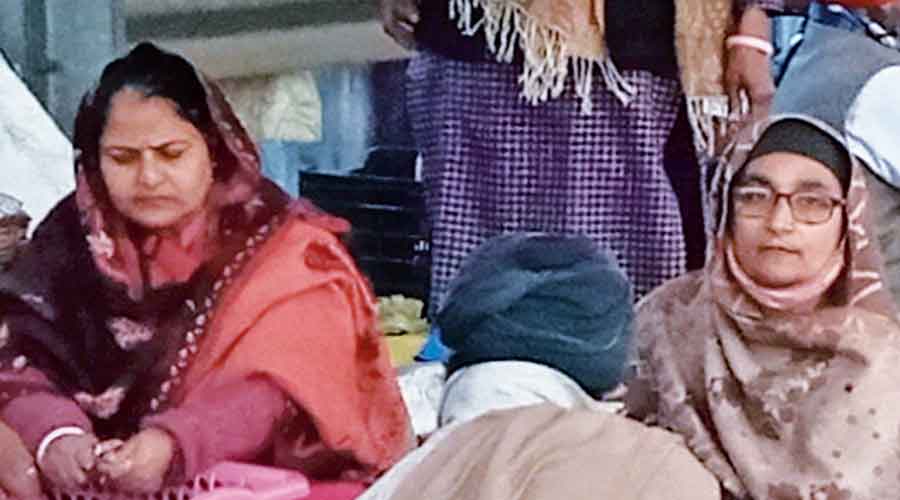A few elderly Sikh men, two boys, a handful of women and a teenage girl — it looked like an extended family.
But what unfolded during a casual conversation with them was a story of human bonding for a cause that has powered the farmers’ agitation at Delhi’s borders with Punjab, Haryana and Uttar Pradesh.
These people were not related. While the Sikh men had come from Moradabad in Uttar Pradesh to protest against the farm laws, the women were Delhi residents who visited the site every morning to cook for the protesters.
The girl had been left there by her father a week ago to do “sewa” (service) for a day, a stint she willingly extended indefinitely.
“These women come in a tempo every day around 7 in the morning,” Gurdayal Singh, one of the elderly protesters at the Ghazipur border between Delhi and Uttar Pradesh, told The Telegraph.
“They offered to help cook at the langar on the first day and started coming daily. They cook prasad (food at langars is called prasad) till noon. In the evening, they cook dinner and leave for home.”
He added: “This little girl has been with us for a week. Now the bonding is so strong that they are like our sisters, our child.”
The farmers’ movement bears testimony to people’s capacity for altruism, for willingly taking up challenges to help strangers without any benefit to themselves.
While masses of women have arrived from various states to help sustain the agitation, local people are lending a hand in their hundreds.
As the conversation wore on, sacks filled with peas and carrots were dropped from a slowly moving mini-truck in front of the protesters’ camp. Someone pointed towards the plentiful stocks, telling the man on the mini-truck there was no need for more. “Use these as well,” he replied nonchalantly.
Asked who was sending the stuff, Gurdayal said: “We don’t know. It’s all managed by the gurdwaras. That’s the Sikh culture. We have enough rice, wheat and pulses while milk and vegetables are supplied daily.”
Nobody is charging for anything. While the farmers had come with enough rations to last months, the perishable stuff is coming free and plentiful. You get tea, biscuits and breakfast in the morning. Whoever arrives at lunchtime is fed roti, rice, dal, vegetables and even kheer. Snacks in the evening, followed by dinner completes the langars’ day.
Curious visitors, activists, police and paramilitary personnel, and the neighbourhood poor are also being fed with affection and respect.
Eatables apart, many stores are providing the daily necessities free to the protesters. “We have quilts, mufflers, woollen socks, mattresses, warm innerwear, toothpaste, toothbrush, soaps, everything. We don’t charge for anything,” said Sukhjeewan Singh, a volunteer at a store.
“We also set up washing machines in the morning for washing clothes.”
Asked where these goods came from, he expressed ignorance saying he was just a “sewadar” (one who serves) but speculated that the gurdwara management committees could be behind the supplies.
Water heaters too are available, apart from medicines and doctors. There’s a blood donation camp where youths can be seen happily lying down to give blood.
The protest site has two huge women-only cabins that can accommodate over 500. Bonfires, hookahs and endless rounds of tea keep the agitators warm. Busy young volunteers, boys and girls, keep running around, looking after things under the guidance of the control room.
What the large-scale arrangements reflect is the protesters’ willingness to stay on for the long haul. It’s virtually impossible to find anyone confessing to fatigue or a desire to return home.
Even an 80-year-old merrily proclaimed: “Mar jayenge, peechhe nahin hatenge (We will die but not back off).”
A slogan often heard over the loudspeakers goes: “Kisan ekta karta hai, marne se nahin darta hai (The farmers stand united, unafraid to die).”
A group of elders from Lakhimpur recalled the revolutionary hero Bhagat Singh and said the farmers’ movement too was a freedom struggle.
Asked whether the government’s obduracy and one of Delhi’s harshest winters might not succeed in breaking their resolve, one of them said: “We haven’t come here for entertainment. Cold and heat can’t deter us: farmers live with nature.”
He added: “The Prime Minister has inflicted this wound on us. Agitations are organised to make demands; this is the first agitation to tell the government, ‘Please don’t give us what we don’t want’. We have come here to teach Modi a lesson. He either withdraws these laws or we destroy his politics.”











